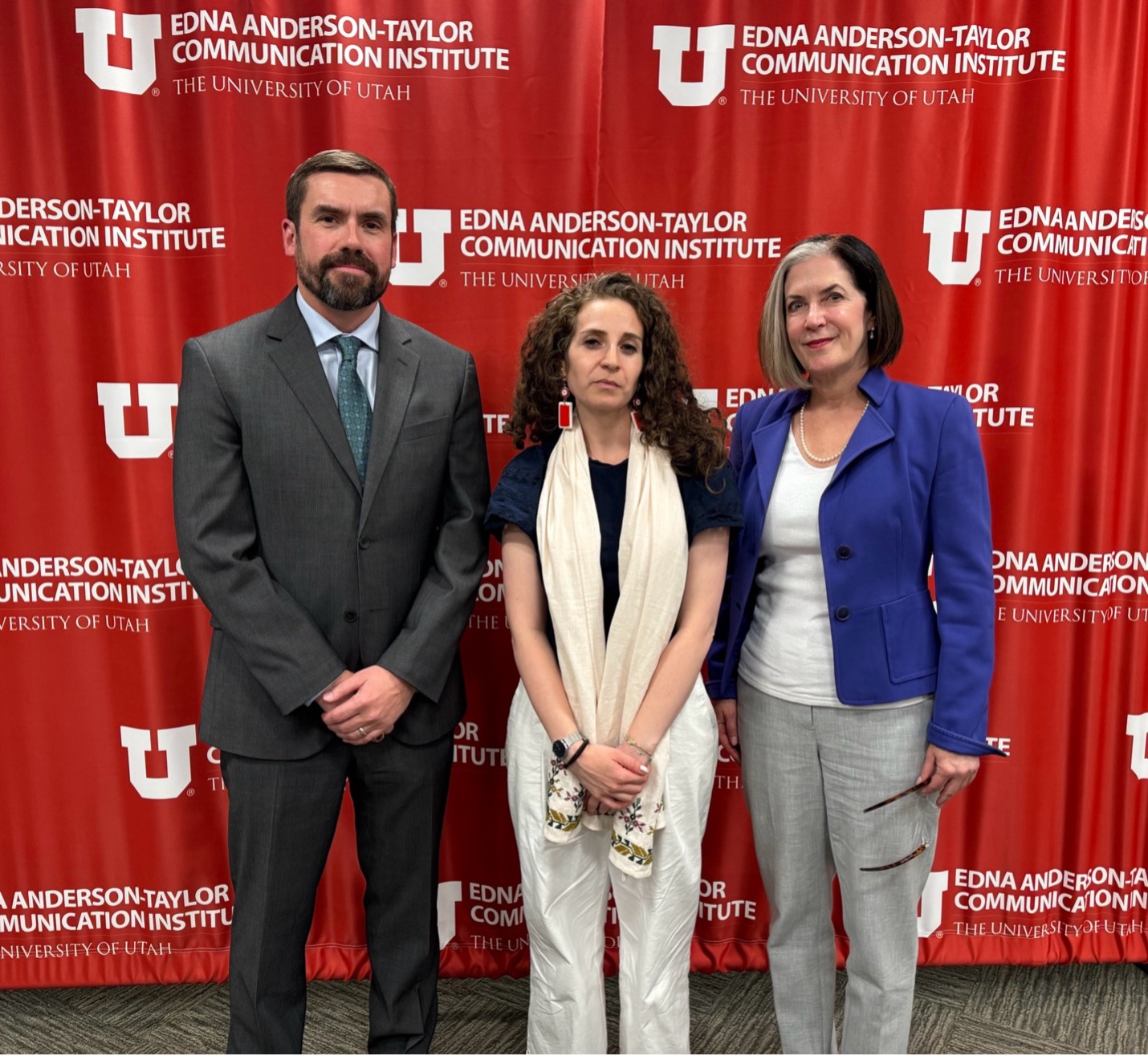Remembering and Reckoning: October 7th Anniversary Conversation

Chris Low (Director of the Middle East Center), Annie Greene (Assistant Professor of History and Affiliate Faculty at the Middle East Center) and Hollis Robbins (Dean of the College of Humanities) stand in the Communication Institute.
On Monday, October 7th, Hollis Robbins, Dean of the College of Humanities, and Chris Low, Director of the Middle East Center, held a conversation titled “Remembering and Reckoning,” centered around the way that anniversaries and dates organize our experiences and public memory. Students, faculty, and staff filled the seats in the Edna Anderson-Taylor Communication Institute.
In her opening remarks, Dean Robbins reflected on the academic-social contract between universities and the state, and what it means for a university to uphold our end of the bargain. As Robbins wryly remarked, “Universities cultivate human capital and return it to the public.” Part of this cultivation is creating and facilitating productive dialogue around painful and intense topics, such as the ongoing conflict in the Middle East and the global impacts it creates.
“For a full year we have been in ongoing intense conversation about events in the Middle East, and in thinking about doing something today, one year later, we had three reasons. One is that the attack on the morning of October 7 has organized our year, and it is the way of things that anniversaries are marked,” Robbins continued. “The second is to remember…and we’ve worked to make a safe and sane space as a community of scholars and a community to be able to simply remember. And the third is to talk to each other, even as we are remembering and reckoning.”
Following Dean Robbins’ remarks, Dr. Low gave a historically grounded overview of the events in the Middle East that led up to, and have transpired since, last year’s October 7th Hamas attack on Israel. Offering a thought-provoking opening proviso, Low asked the audience to be mindful of the broader context. “One question that I want us to ponder as we frame our conversation is: where to begin the conversation? From an Israeli perspective, understandably the focus will be on the event itself. On that day some 1,200 Israelis and other nationals were slaughtered. Some 250 were taken as hostages, including roughly 100 that remain in captivity in Gaza. Not unlike 9/11 for Americans, these are clearly victims of a horrific and shocking act of terrorism. Here, there is no justification. These are heinous crimes. On the other hand, to say that this spasm of violence was surprising requires a certain hubris about Israeli dominance and more than a bit of naiveté about the nature of life in Gaza prior to October 7.”
The discussion ranged from topics such as the importance of clearly distinguishing between anti-Zionism and antisemitism, the role of expertise in understanding conflicts and how experts can defuse conflicts, lower tensions, and get to a place where negotiations might be possible, and how faculty can make a difference in their roles as teachers. The conversation also opened questions of what a people can do when faced with two untenable choices, when all other options have been exhausted, and how the world may respond.
Low and Robbins discussed the often counterproductive tendency towards academic siloes, and what steps the Middle East Center is taking to draw people together in scholarly community. For example, the MEC boasts faculty who are researching both Jewish and Islamic histories in Middle East Studies and is dedicated to bringing in visiting scholars such as Lior Sternfeld and Seth Anziska who integrate Israeli and Jewish history in the broader geopolitical contexts of Palestine, Lebanon, and Iran. This proximity and opportunity for sharing ideas results in deeper, more complex and sophisticated scholarship and teaching, central to the mission of the university as a whole.
Annie Greene, Assistant Professor of History, said of her experience teaching, “In the History of Israel/Palestine class, we are learning to acknowledge that nothing is inevitable. There have always been other possibilities, foreclosed by different actions or circumstances. We are embracing the notion that this history of violence is not a binary. There have always been other actors involved for their own self-interest, and there still are. And we are recognizing traumas experienced by both Palestinians and Israelis. They are all humans. While there is an ongoing power disparity, it is not bothsidesism to feel empathy in response to human trauma.”
Ultimately, the conversation was a testament to the enduring commitment to communication and regard for one another’s viewpoints and beliefs that are hallmarks of the humanities. Low perhaps said it best; “The whole idea is to hold the two worlds [Islamic and Jewish] together instead of placing them in oppositional camps. We’ve worked with Annie Greene to add a “History of Israel/Palestine” course to the university’s curriculum offerings. Even our Middle East reading group stitches together a diverse group of Muslim, Druze, Christian, secular, and Jewish faculty together. I want our center to always normalize that no one gets left out.”
